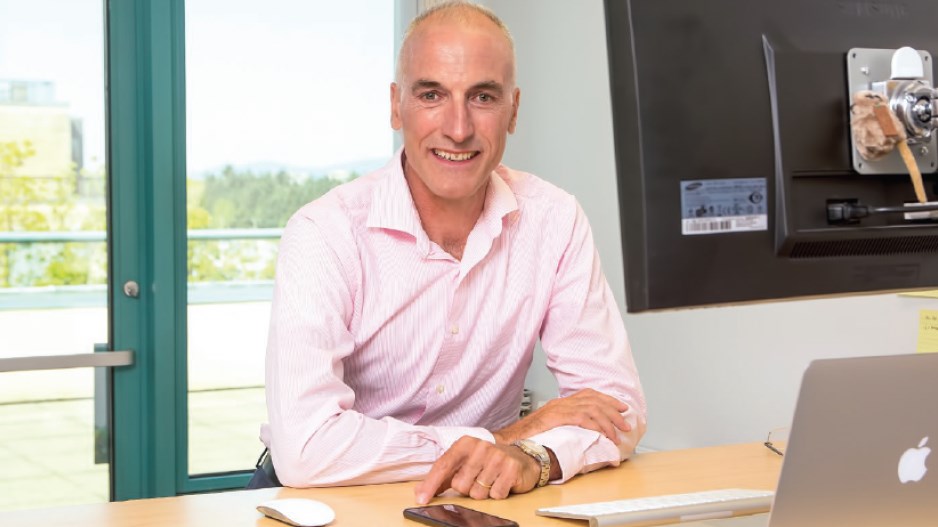It should come as no surprise that B.C.’s tech sector makes up a significant portion of Business in Vancouver’s Fastest-Growing Companies in B.C. list. What may catch some observers off guard, however, is the performance of one particular subsector.
That would be the local life- or health-tech industry, which claimed a number of spots on the list of the province’s 100 fastest-growing companies – including a spot in the top five.
Ranked third overall, Vancouver-based Precision NanoSystems Inc. develops products and expertise in nanoparticle therapeutic delivery for academia and major pharmaceutical firms. The company’s revenue grew an astounding 1,576.9% in the five years since 2013, topping out at $6.76 million.
Also in the rankings’ top 100 are companies like ABM Applied Biological Materials Inc. (No. 40 on the list with a five-year revenue increase of 173.8% to $7.18 million), Stemcell Technologies Inc. (No. 53 with a 129.8% revenue increase to $166.94 million) and BioLytical Laboratories Inc. (No. 58 with a 118.5% revenue increase to $11.8 million).
For life-tech and biotech industry observers, the sector’s strong performance, from larger players like Stemcell to smaller players like Precision, is a welcome sight – especially after the fade-out of once-major local firms like Quadrologic Technology (QLT) and Angiotech Pharmaceuticals Inc. in recent years.
“I think it’s positive and optimistic,” said Tony Brooks, CFO and vice-president of entrepreneurship and commercialization at the non-profit industry group Genome BC, who added that the diversity in strong companies shows the strength of the local life-tech ecosystem. “Throughout this whole period, we’ve had a very strong research base at our academic institutions, and now we are putting in place some building blocks to help develop entrepreneurs who will move more of this technology onto the commercial space. So this is an exciting time for the life-tech sector in B.C.”
The Genome BC executive also mentioned that other major players continue to occupy the sector locally, including Telus Health and Richmond-based McKesson Medical Imaging – both of which employ workers in the hundreds, if not more.
Part of the reason for the success of the life-tech sector, Brooks said, can be traced to accessibility. He notes that as technology advances and more services give consumers more control over aspects of their health, these consumers are turning accessibility into demand.
“Genomics, for example, is one of those things that, 10 or 15 years ago, it was kind of a pipe dream to get your genome sequence,” Brooks said. “I think that this is part of the process of socializing an individual’s biology. People have a much greater understanding of the fact that genetics have many impacts in their lives … and people are, if you’d like, taking a little more control over their own health and their lives, rather than just leaving it to health professionals. That’s where the opportunity comes.”
But he added that the challenge is to increase the number of entrepreneurs and investors who are familiar with life tech, which can be very different from other technology sectors in its research lead time and commercialization processes. That’s why the BC Tech Association partnered with Genome BC in 2016 to form the HyperGrowth: Life accelerator program, which encourages entrepreneurial interest in developing health tech with local researchers and academics.
In May, the accelerator celebrated the graduation of its second cohort, a group of five companies. Brooks said the hope is to produce an effect similar to that of the formerly Burnaby-based digital imaging stalwart Creo – now a part of Eastman Kodak Co. – in that several employees of the company eventually started their own firms, creating a foundation for a big part of the local tech ecosystem.
“It’s like planting trees; you plant one tree, and it grows up and drops seeds, which start the growth of a bunch of smaller trees,” Brooks said of HyperGrowth’s goals. “So you have to foster players of all sizes; in this program, we are just taking the little companies and moving them forward, but the hope is that, in the future, companies that have been through this program will employ more people, and some of those entrepreneurs will say, when they are done with their first companies, that they want to start their next startups.”
HyperGrowth isn’t the only player in this field. National non-profit Mitacs has stepped up efforts in going the academic route in encouraging entrepreneurship, helping researchers with internships and other programs to launch startups in medical-related fields. One company aided by the process, Primary Peptides Inc., was able to gain a licensing agreement with a Chinese pharmaceutical conglomerate thanks to Mitacs.
Mitacs CEO Alejandro Adem echoed Brooks’ sentiment that B.C.’s strong academic base – anchored by top institutions like the University of British Columbia – and the number of highly trained research personnel being produced could be the main reason the life-tech sector here may be only beginning to scratch the surface of its potential.
“The power of a young person with an analytical mind – that’s the power in an innovation-driven environment,” Adem said. “And this is easily scalable; if a company expands and needs 80 interns in five years’ time, we can support that growth every step of the way.… We have a lot of talent that has no outlet, and it is our opinion that every PhD graduate should have an internship as soon as they are ready. The key is that these students should be given a chance to see what kind of impact their abilities can make.” •




